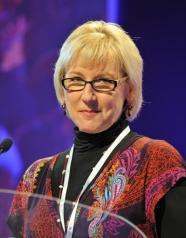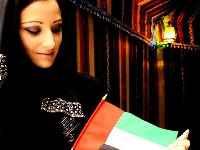
Women ski jumpers - barred from the Vancouver Winter Games - have a surprise ally as they try to lift off at the 2014 Olympics in Russia: Governor-General Michaëlle Jean.
Ms. Jean quietly lobbied International Olympic Committee chief Jacques Rogge as she sat beside him at the opening ceremonies a week ago. She relayed what she heard to 18-year-old Canadian jumper Atsuko Tanaka at a reception at Canada House in Whistler Tuesday night.
"She just said that she had a chat with Jacques Rogge and how he said he was confident about 2014 ski jumping and women being part of it," Ms. Tanaka said in an interview. "It's good news but it's even better that it's coming from the Governor-General."
As men jump for gold in the 140-metre event today, the women's fight to fly in the Olympics has shone a light on the European-dominated sport.
The biggest stars are stick-thin, boy-like men whose physiques help them fly farther. Some speculate that women aren't welcome in a sport where they might outclass men, where distance jumped is directly correlated with weight.
With little organizational support, an American woman, Lindsey Van, had the normal hill record jump of 105.5 metres at Whistler until last week, when it was eclipsed by a handful of top-tier men, including gold medalist Simon Ammann of Switzerland, who is 5-foot- 8 and 128 pounds and jumped only a bit farther: 108 metres.
The exclusion of women jumpers from Vancouver - based on the IOC's ruling that there are not enough countries or competitors involved - sparked a major controversy. Some jumpers took 2010 Olympics organizers to court on Charter of Rights grounds, a fight that ended only two months ago when the Supreme Court refused to hear a final appeal.
Jumpers had enlisted Helena Guergis, Ottawa's Minister of State for the Status of Women, but she failed to get Mr. Rogge's ear, as Ms. Jean did on her own volition, according to Ms. Tanaka. (Ms. Tanaka is one of two women in a group of 20 forejumpers - who make test jumps to ensure the facility at Callaghan Valley near Whistler is correctly calibrated. She jumped yesterday from the 140-metre large hill on which 50 men compete today.)
Click here to read the full story:
By David Ebner
The Globe and Mail
Photo Credit:
ctvolympics.ca
2010-02-22
Posted in Women In the News

UN Secretary General Ban Ki-moon on Sunday said he intended to make Sweden's Margot Wallstrom his special representative tasked with combating sexual violence against women and children in conflicts.
Ban announced he wanted to appoint the 55-year-old outgoing vice-president of the European Commission during a speech at the opening of the African Union's 14th summit in Addis Ababa.
"I have informed the UNSC of my intention to appoint Margot Wallstrom, vice-president of the European Commission, as my special representative to intensify efforts to end sexual violence against women and children in conflict situations," he said.
"We will continue efforts to end the conflicts in the east (of the Democratic Republic of Congo), restore state authority, facilitate the return of refugees, and protect civilians against all forms of violence including sexual violence," Ban said.
"I'm horrified and outraged by the use of rape as a weapon of war," he said.
The Swedish diplomat said Sunday she would lobby for sexual violence in war to be recognised as a war crime, attacking what she said was a tendency to explain the abuse of women as "cultural."
Click here for the full story:
AFP
Thanks to:
Pauline Lowenborg
AWR Member & Fan
2010-02-22
Posted in Women In the News

Secretary of State Hillary Rodham Clinton praised an ICF International-managed women's forum during her trip this week to Jeddah, Saudi Arabia. Speaking at a Town Hall meeting at Dar Al-Hekma College, Clinton addressed more than 500 individuals, including female students of the U.S.-Saudi Women's Forum on Social Entrepreneurship, a project managed by ICF International.
"Some of you recently participated in the U.S.-Saudi Women's Forum on social entrepreneurship," Clinton said. "The result is a program that has given 100 young Saudi women training in business and leadership, and the tools to begin your own enterprises in your communities. And this is just one example of the kind of forward thinking and effective ways that women around the world can join together through such educational exchanges and opportunities to look for ways to make contributions in our own communities."
"Secretary Clinton's recognition of this important project highlights the impact ICF's Strategic Communications and Marketing Division is having in the international arena. Based on our experience working with women, youth, government, and civic organizations in the Middle East and North Africa region, we look forward to continuing to support the Middle East Partnership Initiative in creating effective civic engagement programs," said Kris Tremaine, ICF senior vice president.
In April 2009, ICF International launched an innovative pilot program on women's social entrepreneurship in Jeddah. Funded through a cooperative agreement from the U.S. Department of State, Office of the Middle East Partnership Initiative, the project aims to teach college-age women in Saudi Arabia how to launch social enterprises by helping them build their business and leadership skills in order to solve social problems. To implement this program, ICF formed strategic partnerships with Dar Al-Hekma College, a private all-girls college in Jeddah; Babson College's Center for Women's Leadership, Babson Park, Mass.; and Wellesley Centers for Women, Wellesley, Mass.
One year after the launch of the program, young women in Jeddah have learned about social entrepreneurship, and have been taught how to turn their ideas into sustainable action. Social ventures have been developed as a result of the program. These programs range from a recycling company to an organization helping speech and hearing impaired women become self-reliant and independent.
Click here to read the full story:
By Steve Anderson
Wall Street Journal
2010-02-22
Posted in Women In the News

Robyn Bresnahan reports on a mother of four, who made history in 2003 by becoming the first female deputy commanding officer of a combat arms unit in the Canadian military.
Lt Col Jennie Carignan is based in Kandahar province in southern Afghanistan - one of the most dangerous parts of the country - and commands a regiment of engineers and landmine experts.
Col Carignan says the men under her command treat her like any other soldier - but it wasn't always that way.
"I had some tension at the start of my career as a young lieutenant," she told the BBC's World Update programme.
"But a lot of young lieutenants get that sort of resistance when they come in. Basically, you have to earn your stripes."
Having 23 years in the military under her belt, with missions in the Golan Heights and in Bosnia-Hercegovina, helps her command respect.
"I have grown up with everybody. It's not like I just parachuted in, the brand new girl in town."
As for the commanders of the Afghan National Army, she says she has been surprised at how well she has been received.
"The uniform helps a lot," she says.
"They treat me like they treat any of my male colleagues. In one instance, the Afghan district leader pointed towards me and said they should be doing the same thing."
Whether on the battlefront or home front, life can be equally challenging.
Click here to read the full story:
BBC.co.uk
Photo credit:
BBC.co.uk
Thanks to
Mark Barker
AWR member & fan
2010-02-22
Posted in Women In the News
Susan notes: Forbes Women columnist Sylvia Ann Hewlett may have been surprised by what she found in Dubai, but I’m not. Khaleeji (i.e.Gulf) women (and Middle Eastern women overall) ROCK!

Even though they are shrouded in abayas, a conference in the Middle East reveals just how many women are ready to move up to the top.
This was no Wall Street or City of London crowd. That was my first thought as I looked around the audience at the second Arab Women's Leadership Forum, held in Dubai last month.
Instead of the Armani-clad executives that you would find at a women's leadership event in New York or London, these women were shrouded in black abayas, many with their heads covered with shailas (head scarves).
Instead of the in-your-face confidence I had grown to expect at high-powered women's conventions, these participants clustered together, shy and silent, like graceful but elusive shadows. Products of a different culture, I reckoned they probably had different values and different goals.
I could not have been more wrong. Three days and dozens of conversations later, I was chastened and deeply impressed.
Far from being trapped in tradition, the Forum--spearheaded by the Dubai Women's Establishment, a government agency, and sponsored by a broad range of private companies--sought to accelerate the pace of Arab women's inclusion in the workplace. Keynote speakers included Selma Aliye Kavaf, Turkey's Minister for Women and Family Affairs, and Aseel Al-Awadhi, member of Parliament for Kuwait.
The sessions centered on how to update antiquated and inflexible work structures to better integrate women and allow them to progress to top jobs.
Click here to read the full story:
By Sylvia Ann Hewlett
Forbes.com
Photo credit:
Khaleejia’s Life
Related Links:
Funny, She Doesn’t LOOK Like An Arctic Explorer
Emirati Filmmaker Nayla Al Khaja Breaks New Ground
More about Dubai on AWR
2010-02-20
Posted in Women In the News
 Women ski jumpers - barred from the Vancouver Winter Games - have a surprise ally as they try to lift off at the 2014 Olympics in Russia: Governor-General Michaëlle Jean.
Women ski jumpers - barred from the Vancouver Winter Games - have a surprise ally as they try to lift off at the 2014 Olympics in Russia: Governor-General Michaëlle Jean. UN Secretary General Ban Ki-moon on Sunday said he intended to make Sweden's Margot Wallstrom his special representative tasked with combating sexual violence against women and children in conflicts.
UN Secretary General Ban Ki-moon on Sunday said he intended to make Sweden's Margot Wallstrom his special representative tasked with combating sexual violence against women and children in conflicts. Secretary of State Hillary Rodham Clinton praised an ICF International-managed women's forum during her trip this week to Jeddah, Saudi Arabia. Speaking at a Town Hall meeting at Dar Al-Hekma College, Clinton addressed more than 500 individuals, including female students of the U.S.-Saudi Women's Forum on Social Entrepreneurship, a project managed by ICF International.
Secretary of State Hillary Rodham Clinton praised an ICF International-managed women's forum during her trip this week to Jeddah, Saudi Arabia. Speaking at a Town Hall meeting at Dar Al-Hekma College, Clinton addressed more than 500 individuals, including female students of the U.S.-Saudi Women's Forum on Social Entrepreneurship, a project managed by ICF International. Robyn Bresnahan reports on a mother of four, who made history in 2003 by becoming the first female deputy commanding officer of a combat arms unit in the Canadian military.
Robyn Bresnahan reports on a mother of four, who made history in 2003 by becoming the first female deputy commanding officer of a combat arms unit in the Canadian military. Even though they are shrouded in abayas, a conference in the Middle East reveals just how many women are ready to move up to the top.
Even though they are shrouded in abayas, a conference in the Middle East reveals just how many women are ready to move up to the top.